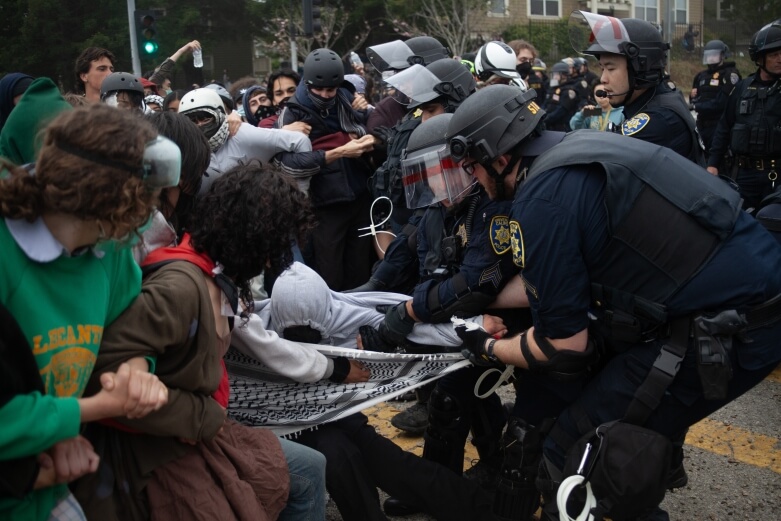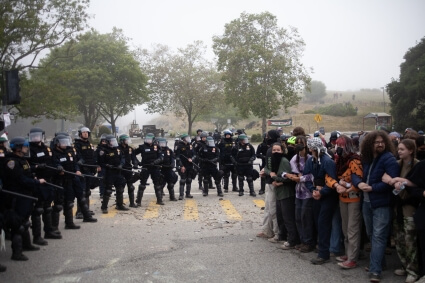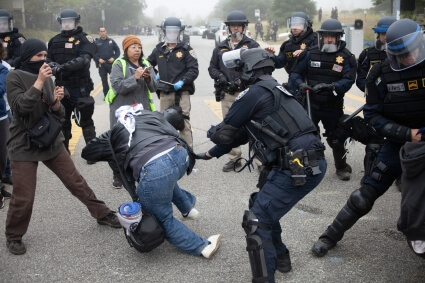Stories of Activism Under Siege: UCSC's Crackdown on Student Protests
Page Media

On the night of May 30, UCSC officials sent in over 100 law enforcement officers dressed in riot gear to clear a pro-Palestine encampment. By morning, authorities had arrested and banned over 110 students and faculty members from campus. The bans went into effect immediately, preventing students and faculty from classes, jobs, and other school resources, such as meal plans, health care, and housing.
Below, Christine Hong, Professor of Critical Race and Ethnic Studies, and Laaila, an undergraduate in Critical Race and Ethnic Studies and Environmental Studies, share their firsthand accounts of the protests and their aftermath at UC Santa Cruz.
|
|
Christine's Story:
Around 11 p.m. on May 30, 2024, I received a frantic call from a student informing me that hundreds of police officers had been deployed by the UC Santa Cruz administration to dismantle the student encampment, which was located in a little-used parking lot at the base of campus. Faculty on our campus have served in the past as a buffer between the police and student protesters, and I knew I had to be there to ensure student safety, to bear witness to the actions of the police, and to protest our administration’s deployment of force to repress our rights to exercise our First Amendment right to speak out against the genocide in Gaza and the university's complicity in that violence.
When I arrived, I saw a line of officers advancing in militarized formation, moving forward, then stopping, and waiting before continuing their slow march down to the base of campus until they were just two to three feet in front of the line of students. From that point forward, they repeatedly attacked us in waves of violence. The police used their batons to force us so tightly into each other that some protesters were dry heaving from the batons being thrust violently into their organs. When students tried to move the batons away from their stomachs, they were ordered to stay still and bear the pain. The person next to me was later hospitalized for their injuries. In what appeared to be their efforts to pluck off protesters for arrest, officers in full riot gear were unrestrained in their violence, including grabbing people by the neck. One person sustained injuries so severe that they suffered neurological damage and now walks using a cane.
We endured this brutality late into the night and into the next morning. As the day progressed, we were so tightly kettled that none of us could move. At one point, I tried to reach my phone to text for help. I could barely move my arm to get my hand into my pocket. One by one, the police arrested us and loaded us onto various vehicles, including campus buses. One of the paddy wagons that transported an earlier group of arrestees off campus was referred to as the “torture bus.” The music on that bus was turned up to ear-splitting decibels. On the bus I was on, we were left inside, tightly handcuffed with zip-ties and unable to access a restroom, despite students pleading with the police to allow them to use a nearby porta potty. Some arrestees were so desperate that they were forced to urinate in the back stairwell, and as the day grew hotter, the stench inside the bus intensified.
As with students at many university campuses across the nation, students at UC Santa Cruz established an encampment to protest the ongoing genocide in Palestine and to demand that the university divest from companies profiting from war and weapons manufacturing as well as comply with the call for boycott, divestment, and sanctions against Israel. But the encampment was far more than a protest. Although not without internal tensions, it was an alternative university that held up a critical mirror to our militarized, neoliberal campus. Students from various majors, including STEM, came together in solidarity, and faculty and local community organizations were a steady and active presence throughout. Food-insecure and unhoused students had three meals a day and a place to sleep, and students longing for a space to critically study and discuss the genocide helped to create an arena for workshops and educational sessions. The encampment, initially established as a way to express an important message, became a powerful symbol of students' commitment to mutual aid, community safety, and socially responsive education.
Following the brutality we endured that night, which left many of us injured, the university further demonstrated its callousness by applying punishment in sweeping unwarranted ways. Those of us who were arrested were abruptly banished from campus even though we presented no threat to persons or property. The university banned its own students—many of whom live on campus and depend on campus resources for basic needs, such as housing, food, and health care. I've heard from students who failed their classes because the bans were enforced during finals. For me, the ban meant I could not access the campus resources necessary to launch an online class on the Korean War, and I struggled without that support. Given the reactionary climate on our campus, I worry about the damage the university will continue to inflict in its campaign to target and punish those involved in any form of protest against the ongoing genocide of the Palestinian people.
When I arrived at Santa Cruz, I found a strong tradition of student activism already in place. I’ve witnessed how this rich history lives on in today’s students who are still striving for a university that is ethically responsive to the world in which we live. I have always organized alongside students and will continue to advocate for them and alongside them.

Laaila's Story:
As a student, I have the right to protest peacefully and voice my concerns regarding how UCSC spends tuition dollars. I also have the right to an education where ideas and perspectives can flow freely.
The encampment established by students at the base of campus was a place of learning and mutual support. We welcomed people from different backgrounds, shared food with the community, and provided education and perspectives that the University continues to stifle and neglect. There was absolutely no violent activity occurring at the encampment.
The night we were attacked by law enforcement was terrifying. The police arrived in full riot gear, flashing their lights at us. Their orders to disperse, if they gave them, were so muffled that we could not make them out. We were also quickly surrounded with no way to disperse.
Despite the fact that we had come together to express our speech and ideas in a peaceful manner, the police treated us as if we were committing violent acts. We were trapped in an hours-long standoff, and I was subjected to repeated baton strikes simply for sitting and exercising my right to protest. The police confiscated our supplies, and we were denied access to restrooms, food, and water.
I was arrested at 6 am, while other protesters remained on-site into the morning, still without basic necessities. We were then handcuffed tightly with zip ties and loaded into vans, where static radio blared at deafening volumes. When we pleaded for relief, the volume was increased, and when I asked to use the restroom, I was met with scorn and laughter. It was a shock to be treated so cruelly simply for exercising my right to protest. When I arrived at the county jail, I received a verbal notice of a campus ban: If I returned to campus, I would face another misdemeanor charge and arrest.
As a freshman, I had passed all my classes and was a dedicated student. But the ban was devastating for me. I failed my courses because I couldn’t access my computer, attend classes, or complete assignments. The ban prevented me from accessing my meal plan, my job, and my housing. It was incredibly destabilizing physically, emotionally, and financially.
Months after the ban, I continue to fear that the school will target and punish me if I become involved in future protests. I don’t understand why the school kicked me off campus without even a hearing, and I worry that they’ll ban me again on the spot. This all has a chilling effect on my right to free speech.
Now I am considering taking time off from college due to the stress, concerns about my safety and belonging, and my lack of trust in the institution.
Read press release here.

California and U.S. Constitutions protect free speech at public universities—including controversial or offensive expression—though some limits do exist. For details, see our Know Your Rights: Free Speech at Colleges and Universities, plus resources on student discipline and protest rights. To report violations, contact our legal intake line.
UPDATE, May 28, 2025: Our lawsuit succeeded in forcing the University of California at Santa Cruz to make important changes that stop them from banishing students or faculty from campus for exercising their right to protest. Now, the university must follow strict rules and provide due process before taking the extreme step of banishing someone from campus.
